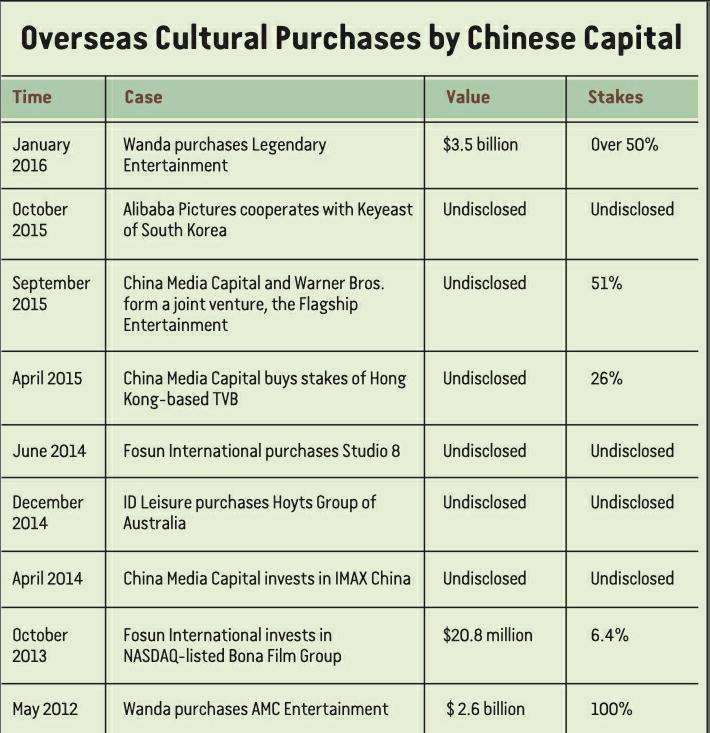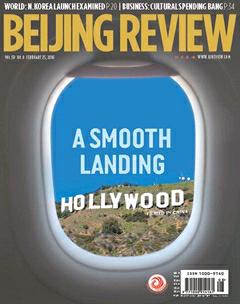RAINING CASH ON HOLLYWOOD
By+Wang+Jun


Chinese companies have once again stepped into the limelight as they entered the stage of the U.S. entertainment industry colossus, Hollywood.
The latest deal between Chinese and Hollywood companies was made by the Dalian Wanda Group and Legendary Entertainment.
On January 12, Wanda Group announced the execution of a definitive merger agreement with Legendary Entertainment at a signing ceremony in Beijing. Wanda announced that it had acquired Legendary for no more than $3.5 billion in cash, making history as Chinas largest cross-border cultural acquisition to date.
As a leading U.S. film production company, Legendarys influence is spread throughout the movie, television, digital and comics industry. It has produced a number of classic blockbusters including the Batman trilogy, Inception, The Hangover, Jurassic World, 300: Rise of an Empire, Pacific Rim, Man of Steel, etc. The com-panys movie productions have grossed more than $12 billion box office revenues around the globe.
“There is an ever growing demand for quality entertainment content worldwide, particularly in China, and we will combine our respective strengths to bring an even better entertainment experience to the worlds audiences,” said Thomas Tull, Chairman and CEO of Legendary, in a statement.
“The acquisition of Legendary will make Wanda Film Holdings Co. the highest revenuegenerating film company in the world, increasing Wandas presence in China and the United States, the worlds two largest markets,”Wang Jianlin, Chairman of Wanda Group, commented on the deal.
According to a statement by Wanda, the acquisition will help Legendary increase its market opportunities, especially in the fast-growing Chinese market, enabling both companies to accelerate growth.
The silver screen
Investors, such as the Wanda Group, Fosun International and investment fund China Media Capital, as well as movie producers such as the Huayi Brothers Media Corp., Hunan TV and Broadcast Intermediary Co. Ltd., are cooperating with Hollywood through acquisitions, joint productions and marketing.
The Legendary deal is actually Wandas second move in the U.S. entertainment industry. In 2012 it acquired AMC Entertainment for $2.6 billion. Due to the deal, the Wanda Group now owns the worlds second largest theater chain, AMC Theatres, as well as the largest theater chain in China and Asia, Wanda Cinemas—making it the largest theater owner in the world.
Wang described his plan in the movie industry; “Wandas businesses will encompass the full scope of movie production, exhibition and distribution, enhancing Wandas core competitiveness and amplifying our voice in the global film market.”
Commenting on the changes in the acquisition targets of Wanda, Zheng Jianhui, senior partner of Orient Securities Investment Co. Ltd., said that the distribution channels and content provided by the two companies complement each other. While Chinese companies have not established compelling advantages in the content of their movies, they can obtain higher benefits by focusing on improving their distribution channels. That explains why theater operators earn more than content providers, even when the Chinese movie market is in the primary stage, where theater costs are not high and the number of theaters is inadequate, though audience numbers are growing rapidly.
“But when Chinese companies become more adept at movie making; high-quality movies reach a larger number of people; there are enough theaters; and the costs of building new theaters grow, higher-quality movies will have a greater significance,” said Zheng at an interview with 21st Century Business Herald.
Fosun International is also one of the earliest Chinese investors in the U.S. entertainment industry. It announced that it had signed a unit purchase agreement with Studio 8 from the United States on June 6, 2014.
Jeff Robinov, founder of Studio 8, once served as president of the Warner Bros. Motion Pictures Group. Movies which Robinov helped oversee include the Batman trilogy, The Hangover films, Inception, Argo which won the Oscar for the best picture and Gravity which won seven Oscars.
“Both China and the United States possess the film markets with the most influence and potential and we are excited to unite the markets, teams, technologies and respective advantages and work together on building a number of top-level films including co-production films between China and other countries,”Robinov said.
In a statement released on June 23, 2014, Fosun said that through this deal, it plans to bring Hollywoods advanced film-making expertise, movie concept and technology, as well as complete production and distribution workflows to the Chinese market. The measure is meant to boost Chinas movie industry and contribute to the growth of global movie industry. Studio 8 would therefore have more opportunities to share Chinese elements and stories in its co-productions.
The statement also revealed that besides bringing the best Hollywood movies to Chinese audiences, Fosun also planned to establish an investment, financing and business operation platform based on Chinas cultural industry, aimed at the global movie industry.
Recipe for success?
The box office in China, the worlds second largest movie market, reached 44.07 billion yuan ($6.77 billion) in 2015, according to figures from the State Administration of Press, Publication, Radio, Film and Television, Chinas film regulator. Only five years ago, the total annual box office in the country was only 10.17 billion yuan ($1.56 billion).
Executives of the Motion Picture Association of America, including its head of Asia Pacific operations Mike Ellis, and Feng Wei, its chief representative in China, have predicted that China will overtake the United States in 2017 to become the worlds largest movie market.

In 2015, 1.26 billion Chinese watched 54.33 million showings of movies, a total of 8,183 screens were newly installed and 1,420 movie theaters were added, said Entgroup, a big data analysis platform focusing on Chinas entertainment industry. Now China has an aggregate of 32,487 screens.
The enormous market in the worlds most populous nation is Hollywoods target, whose ultimate goal is to get more audiences and revenue through cooperation with their Chinese partners.
In contrast, in the United States, theater owners and studios should brace for a slide in box office sales in 2016, warned Morgan Stanley, the American multinational financial services giant.
As for why Chinese companies have chosen to invest overseas, Zheng listed three reasons. First of all, the upgrading of the consumption structure and the growth of entertainment spending in China have prompted the rapid growth of the entertainment industry as well as increased peoples entertainment demand. Also, since movie production in China still falls behind that of some foreign countries, acquisitions will enable Chinese companies to rapidly improve the quality and quantity of their movie supplies. Finally, the valuation of Chinas entertainment companies is now excessively high compared with the reasonable prices of assets in overseas markets.
Mu Zhaoxi, founder of the U-SYS Marketing Academy, predicted in a commentary on Cnr.cn that Chinese companies will have more opportunities to invest in Hollywood in the future.
Chinese movies can be distributed better through the global market. While the domestic box office is currently experiencing explosive growth, the performance of Chinese-made movies in the overseas markets is not satisfactory. “The most significant aspect of Chinese investments into Hollywood is that they can bring Chinese movies to Hollywood,” said Mu, citing the example that after acquiring AMC in 2012, Wanda brought the top-grossing movie of the year Lost in Thailand to the United States via the American company.
Through collaboration, Chinese companies can acquire more technology and better professionals from Hollywood. Mu said that with exchanges and cooperation with excellent professionals, Chinese companies can try to produce movies of international quality standards. By participating in the production of Hollywood movies, Chinese companies can also improve their own production and distribution capabilities.
Nonetheless, Mu also warned about some possible challenges. Since the laws, supervision, and financial operations in foreign countries are all different from those in China, the success of acquisitions will depend on whether Chinese companies can reorganize their resources proficiently.

“It is not difficult for Chinese movies to be shown in foreign countries, but the export of Chinese culture will be difficult,” said Mu, adding that China must learn more from Hollywood.
Actually not all attempts at collaboration are successful. In 2011, Huayi Brothers and Legendary Entertainment formed a Hong Kong joint venture, Legendary East, which soon split up. In the movie The Great Wall produced by Legendary East in 2015, Huayi Brothers is not seen as a partner.

